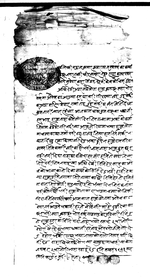A letter from Dhīra Śamśera re complaints of troubles caused by Thakālī traders from Mustang (VS 1923)
ID: L_1200_0026
Edited and
translated by Rajendra Shakya
in collaboration with
Pabitra Bajracharya
Created: 2019-05-13;
Last modified: 2023-01-24
For the metadata of the document, click here
The accompanying edition, translation/synopsis and/or commentary are available under the terms of the Creative Commons Attribution-ShareAlike 4.0 International License
Abstract
In response to a supplication by the mukhiyās and ryots from the villages of Syāra and Kutāṃbhoṭ, Dhīra Śamśera orders Subedāra Kahara Siṃha to look into the complaint that Thakālī traders from Mustang are giving trouble to locals and punish anyone found guilty.Diplomatic edition
[1r]
[Seal of Dhīra Śamśera][unknown seal][unknown seal][unknown seal]1स्वस्तिश्रीमद्राजकुमारकुमारात्मजपुर्वतर्फकाकम्यां2[?]ङ्जनरलश्रीधीर∙सम्सेरजङ्गराणाकस्यपत्रम्
3आगेसुवेदारकहरसिंषतृछेत्रीकेय़थोचित्∙उप्रान्त
4अघिदेषीअठारसयेषोलाहाम्राकुताङ्स्यारभोट्
5तर्फमाअनेत्रवाटआउन्याहरुघरवारीगरीवस्न्यालाइउइमाफी
6क्अडागरिवेपारगर्न्यालाइउइमाफीक्संगसिर्तिदिंथ्या∙
7षुसलागींज्याल्रहंथ्या∙आजकालथाकमुसताङ्का∙थकाली
8हरुआइहाम्राताहाकसैसंगदिनलिनगर्यामाअर्कोकोकर्जा
9लियामावषेडागरिनदिन्याआफुलेदियामाभन्याहाम्राषोला
10माचल्याकाव्याजमापनीवढ्तालाइलिन्याहालतिर्नसकीन∙
11व्याजदिंछुरस्ताकिस्तागरिदेउभन्दाहुदैनहाम्रोदामनदिया
12सम्मतिमिकमारैसरिकाहौभनीजाहाजाहाआफुडुल्छर
13ताहीलगीदिदाताहाकावसिन्दाहरुसंगहामिलेसदाँलिन्या
14तिरोपनीलिननपाइन्याअघिदेषीतिमिहरुसरहकाअने
15त्रकोआयाकालेदियासम्मकोसिर्तिदेउभनीहामीलेमा
16ग्दाहाम्रापुरानैजगामातिरोतार्याकाछौतिमिहरुलेहामिसं
17गवालतिरोषोजीपाउन्याहोइनौभंन्या∙दिनलिनकर्जामा
18पनीयसैगर्छौभनीहाम्राषोलाकादरभाउमाचल्याकोजिन्सी
19दिदानलिजियपक्रीदिन्यागर्दाआजकालहाम्राषोलामाअनेत्रवाट
20वेपारगर्नआउनेथकालीहरुलेयेसैगरिसाह्रैदुषदियाका
21छन्भनीस्यारकुताङ्भोट्तर्फगाउगाउकामुषियारैतीगैह्र
22लेहाम्राहजुरमाविंतिपार्दाजाहेरभयो∙तसर्थ∙२थरजोरि
23वेहोरायैरहेछभन्याथकालीहरुलाइअैनवमोजीमगरिदि
24नु∙वेहोराअर्कैरस्यछभन्याजस्ताकोतस्तोनिसावपारिछि
25नीदेउ∙ताहाछिन्नसकेनौभन्याय़स्मुद्दामाचाहिन्याकाग
26जपत्र∙र२थरजोरीञाहापठाइदेउइतिसम्वत१९२३साल
27मितिफार्गुनसुदी७रोज३शुभ्म्¯¯¯ ¯¯¯ ¯¯¯ ¯¯¯ ¯¯¯ ¯¯¯ ¯¯¯ ¯¯¯
Translation
[1r]
Hail! A letter from Commanding General of the Eastern Front ŚrīDhīra Śamśera Jaṅga Rāṇā, a prince born of a prince
Āge: To SubedāraKahara Siṃha Khatrī Chetrī
“In the past, people who came from other places to the Kutāṅ and Syārabhoṭ [sectors] of the Aṭhāra Saya Kholā [region], and those who stopped to conduct trade would pay the sirto tax on the same terms. [They] stayed for as long as they pleased.
"These days, Thakālīs1 from the Thāka [Kholā region]2 in Mustang come and, in trading with anyone here or taking loan from someone else, make trouble: they do not deliver [on their part of the bargain] or, when giving [loans], charge an interest higher than the current rate in our [Aṭhāra Saya] Kholā [region].
"When [we] tell them: '[We] can’t pay [the loan] at the moment but [we] shall pay the interest. Make provisions for us [to reschedule repayment] (rastākistā)', they say: 'No. You are like our slaves until you pay our money'; and as they take us with them wherever they go, we fail to obtain rent payments that we have always been obtaining on land (tiro) from inhabitants here.
"When we request [them]: 'Pay the same amount of sirto as paid by others like you who have come here from other places in the past', they say: 'We have paid the rent on our previous land. You have no right to ask for rent or payments on the land from us. The same goes for trade loans as well.' They do not accept it when we offer them goods at the current rate in our [Aṭhāra Saya] Kholā [region] [to clear loans,] and they seize persons [who default on a loan]. In this way Thakālīs who come from elsewhere to trade in our [Aṭhāra Saya] Kholā [region] have thus been giving us a lot of trouble these days.”
We came to know of [this situation] after the [above] supplication was delivered to us by mukhiyās, ryots and the like from the villages of Syāra and Kutāṅbhoṭ. Therefore if, after comparing [the accounts of] the two sides, the details turn out to be as stated, then deal with the Thakālīs in accordance with the law (ain). In the case where the details are other [than what is mentioned above], then let justice be delivered accordingly. If you cannot reach a decision there, send the documents relevant to this case here, along with the [the accounts of] the two sides.
Tuesday, the 7th of the bright fortnight of Phālguna in the [Vikrama] era year 1923 (1876 CE). Auspiciousness.
Commentary
This document from Dhīra Śamśera attempts to deal with anomalies in financial transactions in the Aṭhāra Saya Kholā region caused by outside traders from Thāka Kholā in Mustang. Responding to a request by the mukhiyās and ryots alike from the villages of Syāra and Kutaṅbhoṭ, Dhīra Śamśera orders Subedāra Kahara Siṃha to look into the complaints that Thakālī traders from Mustang were not paying the sirto tax and were deviating from usual practices when executing loan deeds. It is clear from the document that many locals were seized, treated as slaves, and in some cases forced to accompany the traders wherever they went if they failed to pay back a loan on time. This seems to have affected the collection of other taxes that were to be submitted to the state treasury.
Thakālīs were known for their trading skills. Trade in Thāka Kholā and the adjoining regions of Lo and Dolpo used to be dominated by Thakālīs, but this ended after the occupation of Tibet by Chinese forces in 1959. The prosperity of Thakālīs derived mainly from their skill and success as traders (Fürer-Haimendorf 1975: 181). The main commodities traded in many areas of Nepal’s Himalayan borderlands were salt and grain. Thakālīs, too, traded in both, along with wool. Salt, collected from salt lakes in Tibet, was exchanged for grain grown mainly in the lower regions of Nepal (Fürer-Haimendorf 1975: 184). This document shows that Thakālī traders from the Kālī Gaṇḍakī region not only travelled to the lower regions of Nepal but also to north-eastern regions along the Buḍhī Gaṇḍakī River.

